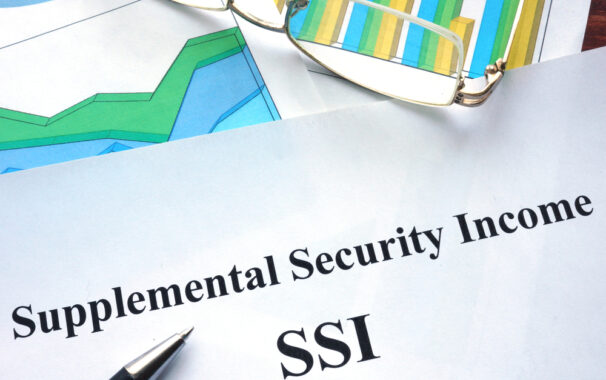
Supplemental Security Income (SSI) is a federal program that helps people with disabilities and very low income and assets. Approximately 8.1 million Americans rely on a monthly SSI benefit to pay for their basic needs including rent, food, transportation, utilities, and healthcare co-pays.
In order to qualify for SSI, you must be aged, blind or “disabled.” SSI applicants who are seeking benefits based on a disability must show that they have a physical or mental impairment that makes it impossible for him/her to engage in any job whatsoever. The impairment must be expected to last for longer than one year or to result in death.
An SSI beneficiary must have very limited income and resources. SSI recipients get only a modest monthly benefit, and this sum is reduced by any income they may have. The federal benefit amount for an individual eligible for SSI in 2019 is $771 per month. The state supplement in New Jersey is $31.25 per month. As a result, the total monthly SSI benefit in New Jersey is $802.25. The federal benefit amount for an eligible couple is $1,157 per month.
Once an SSI applicant has shown that she is disabled, she must also prove that she has less than $2,000 in her name. For couples, the maximum is $3,000.
Under the Supplemental Security Income Restoration Act of 2019, or H.R. 4280, introduced in the House in September, individual SSI recipients would be allowed to have $10,000 in assets, while the limit for couples would be double that, or $20,000, eliminating the marriage penalty. And, for the first time, these limits would be indexed to inflation.
In addition, the Supplemental Security Income Restoration Act, would increase the amount of disregarded income that beneficiaries can take in each month. And, the bill would also repeal penalties for marrying. The bill would also eliminate what is known as the in-kind support and maintenance rule, which penalizes beneficiaries who receive certain benefits, such as food and shelter, from friends and family.
In summary, several needed updates to the SSI program’s eligibility rules will be made under the proposed law:
- Individuals will be able to save up to $10,000 and couples will be able to save up to $20,000 for emergencies such as car repairs, new roofs, and other unexpected expenses without losing benefits.
- Individuals will be able to receive up to $123 monthly from other sources, such as Social Security benefits or pension payments without a corresponding loss in benefits.
- Individuals who are able to work will be able to earn up to $399 a month without being penalized.
- Individuals who live in households with others, including family members, will no longer be penalized with lower benefits through the in-kind support and maintenance provision.
- Individuals who transfer assets (even small amounts of money to a family member) will no longer suffer harsh penalties.
- Couples will receive their full SSI benefit, totaling twice the individual rate, rather than a reduced marriage penalty rate.
- State and local earned income tax credits and child tax credits will be excluded from income calculations in the same manner as general tax payments.
The Supplemental Security Income Restoration Act of 2019 is annexed here –
For additional information concerning social security and SSI disability appeals, visit:
Categories
- Affordable Care Act
- Alzheimer's Disease
- Arbitration
- Attorney Ethics
- Attorneys Fees
- Beneficiary Designations
- Blog Roundup and Highlights
- Blogs and Blogging
- Care Facilities
- Caregivers
- Cemetery
- Collaborative Family Law
- Conservatorships
- Consumer Fraud
- Contempt
- Contracts
- Defamation
- Developmental Disabilities
- Discovery
- Discrimination Laws
- Doctrine of Probable Intent
- Domestic Violence
- Elder Abuse
- Elder Law
- Elective Share
- End-of-Life Decisions
- Estate Administration
- Estate Litigation
- Estate Planning
- Events
- Family Law
- Fiduciary
- Financial Exploitation of the Elderly
- Funeral
- Future of the Legal Profession
- Geriatric Care Managers
- Governmental or Public Benefit Programs
- Guardianship
- Health Issues
- Housing for the Elderly and Disabled
- In Remembrance
- Insolvent Estates
- Institutional Liens
- Insurance
- Interesting New Cases
- Intestacy
- Law Firm News
- Law Firm Videos
- Law Practice Management / Development
- Lawyers and Lawyering
- Legal Capacity or Competancy
- Legal Malpractice
- Legal Rights of the Disabled
- Liens
- Litigation
- Mediation
- Medicaid Appeals
- Medicaid Applications
- Medicaid Planning
- Annuities
- Care Contracts
- Divorce
- Estate Recovery
- Family Part Non-Dissolution Support Orders
- Gifts
- Life Estates
- Loan repayments
- MMMNA
- Promissory Notes
- Qualified Income Trusts
- Spousal Refusal
- Transfers For Reasons Other Than To Qualify For Medicaid
- Transfers to "Caregiver" Child(ren)
- Transfers to Disabled Adult Children
- Trusts
- Undue Hardship Provision
- Multiple-Party Deposit Account Act
- New Cases
- New Laws
- News Briefs
- Newsletters
- Non-Probate Assets
- Nursing Facility Litigation
- Personal Achievements and Awards
- Personal Injury Lawsuits
- Probate
- Punitive Damages
- Reconsideration
- Retirement Benefits
- Reverse Mortgages
- Section 8 Housing
- Settlement of Litigation
- Social Media
- Special Education
- Special Needs Planning
- Surrogate Decision-Making
- Taxation
- Technology
- Texting
- Top Ten
- Trials
- Trustees
- Uncategorized
- Veterans Benefits
- Web Sites and the Internet
- Webinar
- Writing Intended To Be A Will







Vanarelli & Li, LLC on Social Media